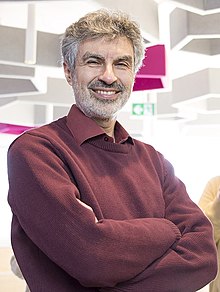Yoshua Bengio | |
|---|---|
 Yoshua Bengio in 2019 | |
| Born | March 5, 1964 Paris, France |
| Citizenship | Canada |
| Alma mater | McGill University |
| Known for | |
| Relatives | Samy Bengio (brother) |
| Awards | Marie-Victorin Prize (2017) Turing Award (2018) AAAI Fellow (2019) Legion of Honor (2022) |
| Scientific career | |
| Fields | Machine learning Deep learning Artificial intelligence[1] |
| Institutions | Université de Montréal MILA Element AI |
| Thesis | Artificial Neural Networks and their Application to Sequence Recognition (1991) |
| Doctoral advisor | Renato de Mori[2] |
| Notable students | Ian Goodfellow[2] |
| Website | yoshuabengio |
Yoshua Bengio OC FRS FRSC (born March 5, 1964[3]) is a Canadian computer scientist, most noted for his work on artificial neural networks and deep learning.[4][5][6] He is a professor at the Department of Computer Science and Operations Research at the Université de Montréal and scientific director of the Montreal Institute for Learning Algorithms (MILA).[1]
Bengio received the 2018 ACM A.M. Turing Award (often referred to as the "Nobel Prize of Computing"), together with Geoffrey Hinton and Yann LeCun, for their work on deep learning.[7] Bengio, Hinton, and LeCun are sometimes referred to as the "Godfathers of AI" and "Godfathers of Deep Learning".[8][9][10][11][12][13] As of November 21 2023, he has the highest h-index of any computer scientist.[14]
Bengio was born in France to a Jewish family who emigrated to France from Morocco, and then relocated again to Canada.[15] He received his Bachelor of Science degree (electrical engineering), MSc (computer science) and PhD (computer science) from McGill University.[2][16]
Bengio is the brother of Samy Bengio,[15] also an influential computer scientist working with neural networks, who is currently Senior Director of AI and ML Research at Apple.[citation needed]
The Bengio brothers lived in Morocco for a year during their father's military service there.[15] His father, Carlo Bengio was a pharmacist and a playwright; he ran a Sephardic theater company in Montreal that performed pieces in Judeo-Arabic.[17][18] His mother, Célia Moreno, was an actor in the 1970s in the Moroccan theater scene led by Tayeb Seddiki. She studied economics in Paris, and then in Montreal in 1980 she co-founded with artist Paul St-Jean l’Écran humain, a multimedia theater troupe.[19]
After his PhD, Bengio was a postdoctoral fellow at MIT (supervised by Michael I. Jordan) and AT&T Bell Labs.[20] Bengio has been a faculty member at the Université de Montréal since 1993, heads the MILA (Montreal Institute for Learning Algorithms) and is co-director of the Learning in Machines & Brains program at the Canadian Institute for Advanced Research.[16][20]
Along with Geoffrey Hinton and Yann LeCun, Bengio is considered by journalist Cade Metz to be one of the three people most responsible for the advancement of deep learning during the 1990s and 2000s.[21] Among the computer scientists with an h-index of at least 100, Bengio was as of 2018 the one with the most recent citations per day, according to MILA.[22][23] As of December 2022, he had the second highest Discipline H-index (D-index) in computer science.[24] Thanks to a 2019 article on a novel RNN architecture, Bengio has an Erdős number of 3.[25]
In October 2016, Bengio co-founded Element AI, a Montreal-based artificial intelligence incubator that turns AI research into real-world business applications.[21] The company sold its operations to ServiceNow in November 2020,[26] with Bengio remaining at ServiceNow as an advisor.[27][28]
Bengio currently serves as scientific and technical advisor for Recursion Pharmaceuticals[29] and scientific advisor for Valence Discovery.[30]
Following concerns raised by AI experts about the existential risks AI poses on humanity, in May 2023, Bengio stated in an interview to BBC that he felt "lost" over his life's work. He raised his concern about "bad actors" getting hold of AI, especially as it becomes more sophisticated and powerful. He called for better regulation, product registration, ethical training, and more involvement from governments in tracking and auditing AI products.[31][32]
Speaking with the Financial Times in May 2023, Bengio said that he supported the monitoring of access to AI systems such as ChatGPT so that potentially illegal or dangerous uses could be tracked.[33] In July 2023, he published a piece in The Economist arguing that "the risk of catastrophe is real enough that action is needed now."[34]
In 2017, Bengio was named an Officer of the Order of Canada.[35] The same year, he was nominated Fellow of the Royal Society of Canada and received the Marie-Victorin Quebec Prize.[36][37] Together with Geoffrey Hinton and Yann LeCun, Bengio won the 2018 Turing Award.[7]
In 2020, he was elected a Fellow of the Royal Society.[38] In 2022, he received the Princess of Asturias Award in the category "Scientific Research" with his peers Yann LeCun, Geoffrey Hinton and Demis Hassabis.[39] In 2023, Bengio was appointed Knight of the Legion of Honour, France's highest order of merit.[40]
In August 2023, he was appointed to a United Nations scientific advisory council on technological advances.[41][42]
He was recognized as a 2023 ACM Fellow.[43]